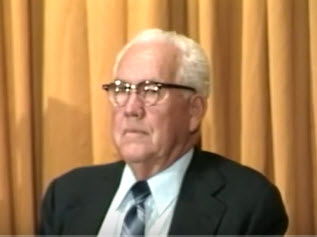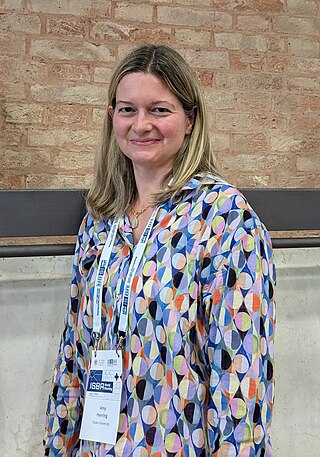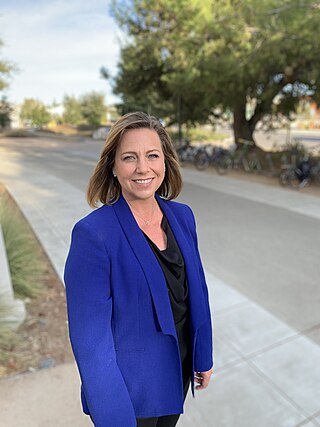Related Research Articles

Joseph W. Cullen was an American cancer prevention and rehabilitation researcher and briefly director of the AMC Cancer Research Center (1989-1990). He previously worked at the VA Hospital in Maryland (1968-1973), the National Institutes of Health (1973), the National Cancer Institute (NCI), and the Jonsson Comprehensive Cancer Center (1976-1982), holding high-level positions such as division director at several. He was a coordinator, creator, and researcher for the Smoking Tobacco and Cancer Program at the NCI, the largest anti-smoking campaign in the world at that time. Cullen wrote more than 90 publications in his lifetime, including four books.
Graham Andrew Colditz MD, DrPH is an Australian chronic disease epidemiologist. He is the inaugural Niess-Gain Professor at Washington University School of Medicine, where he is associate director for Prevention and Control at the Alvin J. Siteman Cancer Center. He directs the Master of Population Health Science at Washington University School of Medicine. During medical training he was excited by the potential for prevention of chronic diseases. With encouragement from mentors he pursued training in the US as it was routine for academics in Australia to obtain overseas training at that time. He is internationally recognized for leadership in cancer prevention, and is often interviewed by media for input on this topic. With members of Cancer Prevention and Control at Siteman, he blogs on issues relating to cancer prevention and screening. According to Google Scholar statistics, Colditz has a h-index of more than 300. Colditz was a member of the Institute of Medicine Committee to Review Adverse Effects of Vaccines but resigned, along with Ruby H. N. Nguyen, before it produced its seminal report.
Terri Crawford Hansen is a journalist who focuses primarily on environmental and scientific issues affecting North American tribal and worldwide indigenous communities. Hansen, an enrolled Native American citizen of the Winnebago Tribe of Nebraska is a correspondent for YES! Magazine and Indian Country Today, and contributes to Earth Island Journal, Pacific Standard, High Country News, VICE News, PBS, BBC News and other news publications. Hansen maintains an online public service news project titled Mother Earth Journal.

Morris Howard Hansen (1910–1990) was an American statistician. While at the United States Census Bureau, he was one of the first to develop methods for statistical sampling and made contributions in many areas of surveys and censuses.

Philip Morris Hauser was a demographer and pioneer in urban studies who was a president of the American Sociological Association, the American Statistical Association and the Population Association of America. For more than 30 years he was director of the Population Research Center at the University of Chicago where he also served as the Lucy Flower Professor of Urban Sociology.

Janet Lippe Norwood was an American statistician and the first female Commissioner of the U.S. Bureau of Labor Statistics (BLS) when she was appointed in 1979 by President Jimmy Carter. She was reappointed twice by President Reagan. She left the Bureau in 1991 and joined the Urban Institute as a Senior Fellow, a position she held until 1999. She was also appointed as the Chair of the Advisory Council on Unemployment Compensation, first by President George H. W. Bush in 1993 and then re-elected by President Bill Clinton. She stepped down from that position in 1996. She received numerous awards including several honorary doctorate degrees from academic institutions, including Harvard University.
Jeanne Elaine Griffith was the director of the Division of Science Resource Studies at the National Science Foundation. She was known throughout her career as a supporter and mentor of junior staff in the Federal Statistical System of the United States.
Julia Ingrid Lane is an economist and economic statistician who works as a professor at New York University's Wagner Graduate School of Public Service, as well as NYU's Center for Urban Science and Progress, helping CUSP to build CUSP data facility. Also, she works in NYU's GovLab as a Provostial Fellow for Innovation Analytics and Senior Fellow.

Amy Helen Herring is an American biostatistician interested in longitudinal data and reproductive health. Formerly the Carol Remmer Angle Distinguished Professor of Children's Environmental Health at the University of North Carolina at Chapel Hill, she is now Sara & Charles Ayres Distinguished Professor in the Department of Statistical Science, Global Health Institute, and Department of Biostatistics & Bioinformatics of Duke University.

Jonna Ann Keener Mazet is an American epidemiologist and Executive Director of the University of California, Davis One Health Institute. Recognized for her innovative and holistic approach to emerging environmental and global health threats, she is an elected member of the National Academy of Medicine and a fellow of the American Association for the Advancement of Science. Mazet is a professor of Epidemiology and Disease Ecology at the UC Davis School of Veterinary Medicine, where she focuses on global health problem solving, especially for emerging infectious disease and conservation challenges.
Susan S. Ellenberg is an American statistician specializing in the design of clinical trials and in the safety of medical products. She is a professor of biostatistics, medical ethics and health policy in the Perelman School of Medicine at the University of Pennsylvania. She was the 1993 president of the Society for Clinical Trials and the 1999 President of the Eastern North American Region of the International Biometric Society.
Jennifer D. Parker is an American statistician who works as the Director of the Division of Research and Methodology at the National Center for Health Statistics. Her publications include highly-cited works relating socioeconomic status, air pollution, and birth weight of infants.
Janet Turk Wittes is an American biostatistician and entrepreneur, known for her work on statistical issues in clinical trials. She is the former chief of statistics at the National Heart, Lung and Blood Institute. One of her three children is Benjamin Wittes, legal and national security journalist.

Bhramar Mukherjee is an Indian-American biostatistician, data scientist, professor and researcher. She is currently serving as the inaugural Senior Associate Dean of Public Health Data Science and Data Equity at the Yale School of Public Health from August 1, 2024. She is also appointed as Anna MR Lauder Professor of Biostatistics, Professor of Epidemiology with secondary appointment as Professor of Statistics and Data Science at Yale University.
Lynda Shirley Tepfer Carlson is a retired American statistician, formerly the director of the National Center for Science and Engineering Statistics of the National Science Foundation. As director of the center, she led an effort to collect information about college education by including this topic in the American Community Survey of the United States Census Bureau.
Rebecca Allana Hubbard is an American biostatistician whose research interests include observational studies and the use of electronic health record data in public health analysis and decision-making, accounting for the errors in this type of data. She is a professor of biostatistics in the Perelman School of Medicine at the University of Pennsylvania.
The Washington Statistical Society (WSS), based in Washington, D.C., is a chapter of the American Statistical Association (ASA). The first American Statistical Association (ASA) meeting in Washington took place on December 31, 1896, for "members living in or near Washington" to hold meetings for scientific discussion. The WSS established its own Constitution in 1926, describing itself as "a branch of the American Statistical Association", and became a chapter of the ASA in 1935.
Kenneth Hugh Mayer is a Professor of Medicine at Harvard Medical School. He is the Medical Research Director and the co-chair of the Fenway Institute. Mayer is also a professor in the Department of Global Health and Population at the Harvard School of Public Health, the Director of HIV Prevention Research and Attending Physician at Beth Israel Lahey Health, and an adjunct professor of Medicine and Community Health at Brown University.
Elizabeth A. (Betsy) Martin is a former American statistician and environmental activist, known for bringing principles from cognitive science into survey design, and for improving the ability of the United States census to count homeless people. She is a former president of the American Association for Public Opinion Research.
Mitchell H. Gail is an American physician-scientist and biostatistician. He is a distinguished investigator at the National Cancer Institute.
References
- 1 2 "Get to know: Jennifer Madans", Team member profiles, Center for Inclusive Policy, retrieved 2022-02-08
- 1 2 "Jennifer Madans", Key Leadership & Staff, Population Reference Bureau, retrieved 2022-02-08
- ↑ "Dr. Jennifer Madans Wed to Immunologist", The New York Times , October 24, 1988
- 1 2 "Jennifer H. Madans" (PDF), Newsroom: Press kits, US Census Bureau, retrieved 2022-02-08
- ↑ "NCHS Taps BEA Director Brian Moyer to Lead Agency", Washington Update, Consortium of Social Science Associations, March 17, 2020
- ↑ "Special Acknowledgment", Health, United States, 2019, National Center for Health Statistics, 2021
- ↑ ASA Fellows list, American Statistical Association, retrieved 2022-02-08
- ↑ Individual members, International Statistical Institute, archived from the original on 2022-09-23, retrieved 2022-02-08
- ↑ "The 2004 Morris Hansen Lecture", Newsletter of the Washington Statistical Society, Washington Statistical Society, November 2004, retrieved 2022-02-08
- ↑ Roger Herriot Award, American Statistical Association, retrieved 2022-02-08
- ↑ "Excellence in Public Service Award", Annual awards, Population Association of America, retrieved 2022-02-08